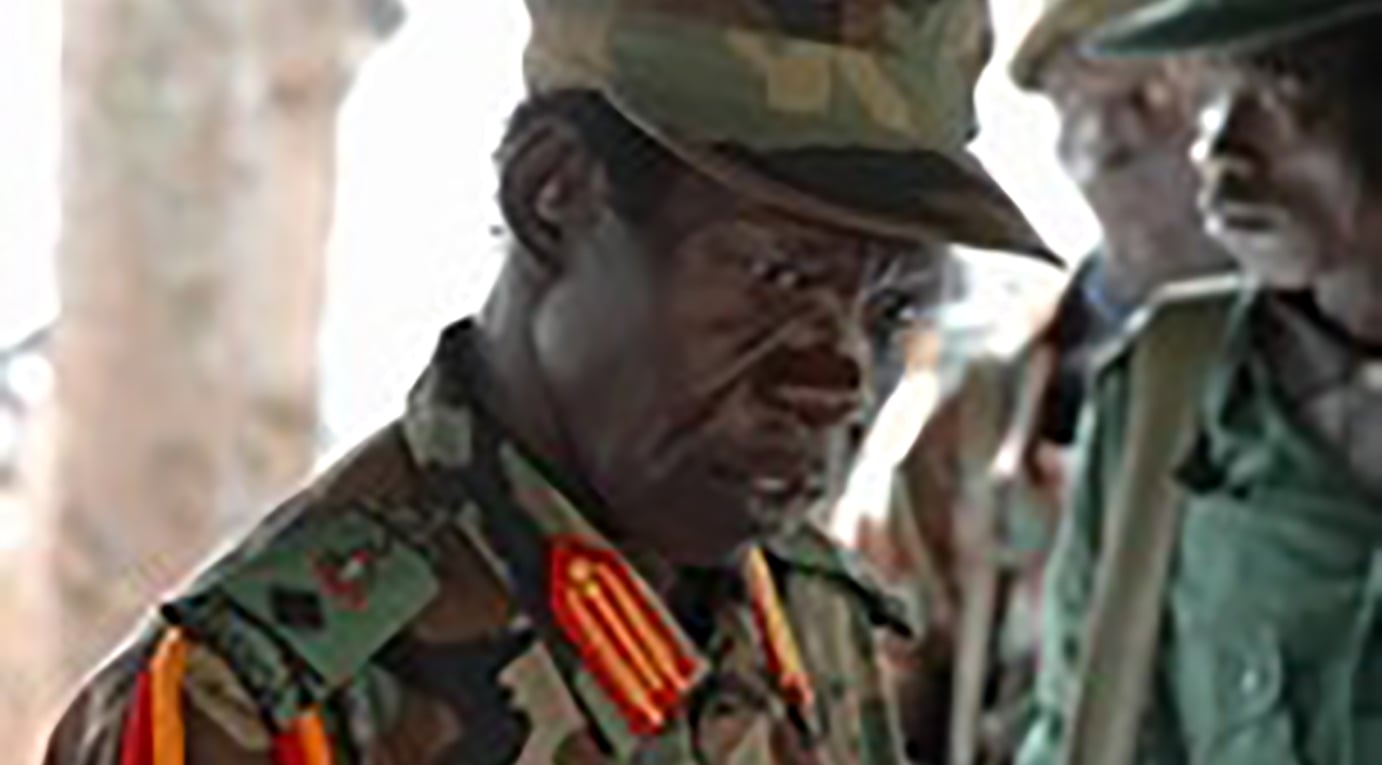QUESTION: What would you like to see as the outcome of the peace talks?
ANSWER: From our position, we would like to see progress. Because, since the talks started it has been one agenda – the cessation of hostilities. We need progress.
Q: Are you satisfied with the way you have been treated?
A: We have talked to [former Mozambican] President [UN envoy, Joachim] Chissano and there is no problem now, because before we were facing a lot of difficulties, like security. He says he is going to solve the problems. We are now satisfied about it.
Q: It has been agreed that the LRA should assemble its forces here in Ri-Kwangba. How many do you expect to assemble?
A: All of them. All the LRA forces.
Q: How many?
A: I can’t tell you that, it is a military secret.
Q: How has the ICC arrest warrant changed your life?
A: It’s not affecting our lives any way, but I think it’s affecting the peace process. It will let down the peace process and the outcome will affect Ugandans themselves. Because if we do not come out [of hiding], it means that peace will not return to Uganda. That will affect all the people of Uganda.
Q: Would you submit yourself to traditional justice?
A: Traditional justice is the alternative. That, I appreciate, but it should be carried out [on] both sides. What happened in northern Uganda [was not caused by the] LRA alone. It is the LRA and [the] Ugandan government. So, traditional justice must happen on both sides.
Q: Why did you join the LRA? What are you fighting for?
A: I’m fighting for my rights, because what had happened in the past – what [President Yoweri] Museveni did – is really undemocratic. That’s why we came in[to] the bush.
A: What happened in northern Uganda?
Q: When the war started, it was not only LRA – LRA was the last group to come in[to] the bush. It was Uganda People’s Democratic Army, led by former Prime Minister Otema Allimadi. That failed; they joined government as if they did not know the cause of their war in the bush. It was UPA [Uganda People’s Army] from the east, even another group – all factions [from] all over Uganda. They were defeated by the government. But LRA remain in position because what we are fighting for we have not yet achieved, so we are still in the bush. Our people are really in great trouble, they are in the camps, they are dying of starvation, poverty, even sickness. That is why we are still resisting and fighting so much for our people. I have seen they want to grab our land – that is not possible, that will not happen even a little. We are fighting up to now. We are very much interested in a federal system of government, so we should be independent. That is what we want. Cut?
Q: What sort of system of government do you support – what sort of ideology?
A: Well, the system of government [in Uganda] now is a military government. No one can deceive us that the present government is really democratic. No, it is a military government and that is what we do not want in Uganda.
Q: Your movement is called the Lord’s Resistance Army. What exactly does it see as an ideal system of government?
A: Lord’s Resistance Army is just the name of the movement, because we are fighting in the name of God. God is the one helping us in the bush. That’s why we created this name, Lord’s Resistance Army. And people always ask us, are we fighting for the [biblical] Ten Commandments of God. That is true – because the Ten Commandments of God is the constitution that God has given to the people of the world. All people. If you go to the constitution, nobody will accept people who steal, nobody could accept to go and take somebody’s wife, nobody could accept to innocently kill, or whatever. The Ten Commandments carries all this.
Q: Is that linked to Alice Lakwena’s Holy Spirit Movement?
A: The Lord’s Resistance Army is a separate movement.
Q: If the peace talks are successful, what is the future of the young soldiers and the women and children with you?
A: They will go back to school. Others will join school. We will all go back home. Those who are willing to go back to school will go back to school. Others, who want to continue to work as soldiers, will continue as soldiers.
Q: How do you see your future?
A:Well, my immediate future – that, I don’t answer yet, because the ICC has blocked it. Unless the indictment is lifted, that is what I have to say about my future. But people should feel hope, that if [the] Ugandan government is really interested in ending the war through dialogue, I think this can be the end of it – to talk peace and solve the differences between the LRA and the government; on the table, through negotiations and end the war. It will end the conflict in Uganda.
Q: Has this become a regional conflict?
A: No, this is the internal conflict of Uganda - it is not a regional conflict. That, I do not accept. Our war is with the Ugandan government. But all people know that if you are fighting with your brother, you can go to your neighbour to help you, to help a little bit so you can go back to fight. Which is why we were in Sudan and we went up to Congo, and now we are in Sudan again.
lh/sr/mw
This article was produced by IRIN News while it was part of the United Nations Office for the Coordination of Humanitarian Affairs. Please send queries on copyright or liability to the UN. For more information: https://shop.un.org/rights-permissions




